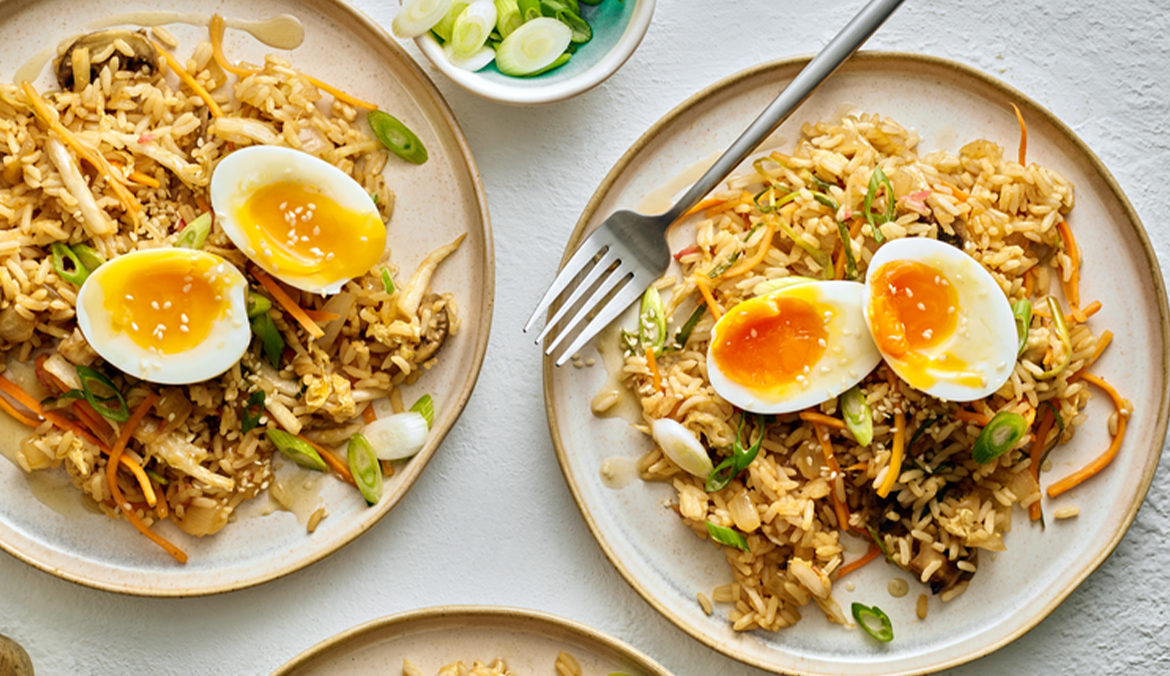After telling myself countless times, “I’ll get to it in a few days,” leftover rice is usually the first to go bad. But it’s not entirely my fault. That’s because, according to Trevor Craig, a food safety expert and corporate director of technical training and consulting at Microbac Laboratories, cooked rice definitely isn’t as shelf stable as the bottle of ketchup that’s been hanging out in the fridge since ‘92. In fact, just a few days, eating leftover rice is out of the question for this food safety expert. Ahead Craig shares the potential consequences of eating spoiled rice and how to correctly store it to spare you from any unexpected surp-rices (ha).
So, how long is leftover rice good for?
According to Craig, leftover rice may spoil faster than you think. In fact, he says it’s usually around the four-day mark. So, why the super quick turnaround time? Craig says bacteria is to blame. “The bacteria found in rice is called Bacillus cereus, which is commonly found in soil and dust and can contaminate food during the growing, harvesting, processing, or cooking stages,” he says.
Although cooking rice, in theory, should eliminate the presence of this bacteria, it isn’t always foolproof. In turn, this can make cooked rice unsafe to eat. “The reason it’s the biggest concern is because this bacteria can form spores that protect it from high temperatures, meaning uncooked rice can have spores of Bacillus cereus, which can survive even when the rice is cooked,” Craig says.
That’s when things get tricky and the risk of foodborne illness begins to rise. “Once it’s out of the high temperature it exits the spore stage and back to vegetative cells that are dangerous,” Craig says. Not to mention, other forms of bacteria—aside from Bacillus cereus—that can also contaminate cooked rice. “There are other bacteria, as well, that can be introduced to rice after cooking that can be dangerous depending on the conditions and if it’s able to multiply,” he says.
Two key factors that can influence bacterial growth: time and temperature. “If you leave your rice out at room temperature, the spores can grow into bacteria and multiply,” Craig says. The longer the conditions are just right for bacteria to develop, the more likely you’ll experience a food borne-related illness. This doesn’t only apply to leftover rice; he also notes that other grains, like pasta and quinoa, are equally as susceptible. “They’re especially risky because they are high in starches and generally don’t have anything in them to prevent bacterial growth,” Craig says. “They also generally maintain a high amount of available water for the bacteria to use and grow as well.”
What happens if you eat expired rice?
Best case scenario: Leftover rice doesn’t make you sick. But that may not always be the case, especially if a large amount of bacteria are involved. In the event that’s the case, here’s what to expect. “Bacillus cereus releases two types of toxins that each cause a different illness: One causes diarrhea, while the other causes vomiting,” Craig says. According to him, symptoms will usually present themselves within six to 15 hours of eating the contaminated food. “The symptoms of Bacillus cereus food poisoning are similar to those of other food poisoning, including nausea, vomiting, diarrhea, and stomach cramps,” he says.
How do you store cooked rice safely?
For starters you’ll want to ensure that you’re consuming cooked rice that was kept in an airtight container in the refrigerator for no longer than four days. (However, if you’re looking to prolong this timeline, Craig recommends freezing the cooked rice, which can help buy some time.) That said, this is all contingent on whether or not the rice was properly cooked and stored in the first place. In other words, always maintaining cooked rice at the appropriate temperatures is likely your best bet when it comes to avoiding leftover rice-related illness.
To do so, quickly cool and store cooked rice in the fridge once it’s made, especially if you’re not going to eat it right away. “Rice should not be left out for more than two hours after cooking it because bacteria can grow rapidly at room temperature. If you are not planning to eat the rice within two hours of cooking it, you should refrigerate it immediately in a tightly-sealed container after it cools,” Craig says. This helps prevent bacteria growth or development of spores. Pro tip: Store the container away from or above raw products to lessen the risk of cross-contamination.
Then, once you’re ready to dig into your (safely kept) leftover rice, make sure it’s adequately warmed up. “When reheating rice, make sure it’s heated to an internal temperature of at least 165°F to kill any bacteria that may be present,” Craig says. Even then, though, cooked rice can still be contaminated. As such, Craig stresses the importance of handling rice safely (and correctly) before it’s even cooked too. “Cooking will kill bacteria but won’t always break down toxins, which are the dangerous parts of the bacteria. So, if you store it incorrectly or for too long, reheating the food won’t make it safe to eat again,” he says. The bottom line? When in doubt, don’t risk it.
How to make an easy cauliflower fried rice dish:
